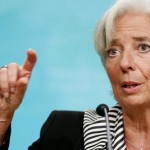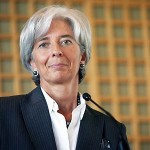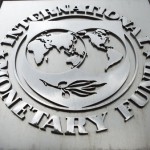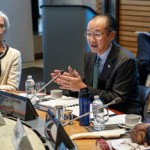Christine Lagarde: huge government and bank debts risk new financial crash

IMF head argues for global co-operation on financial stability, warning against risky investments and low eurozone inflation
Head of the International Monetary Fund Christine Lagarde issued a warning to world leaders on Thursday that they need to do more to deal with huge government and bank debts that continue to drag on growth and undermine the stability of the financial system.
Ahead of a set-piece address at the organisation’s spring conference in Washington, Lagarde said leaders need to co-operate in their efforts to repair government and bank finances to protect against a repeat of the 2008 crash.
Lagarde also vented her frustration at persistent delays to the IMF’s own reform programme, which was agreed in 2010 to increase representation from developing nations but has yet to be implemented.
She described the delay as “utterly disappointing” and pledged to press ahead “to ensure the continued legitimacy, relevance, financial strength, and effectiveness of the Fund”.
The warnings against complacency echoed a report earlier in the week by the IMF that chastised Brussels for failing to put in place a financial lifeboat capable of rescuing more than a few small banks.
The financial stability report also highlighted concerns at the rise of risky investments in the US and difficulties faced by emerging economies destabilised by huge outflows of funds. Low inflation in the eurozone was also a concern, especially as it could herald a downward spiral of low growth and declining real wages, feeding on each other.
She said: “Creating a more dynamic, job-rich global economy remains our collective goal. For this, policymakers should manage the recovery more actively and reinforce their co-operation to minimise negative spillovers and promote financial stability.”
The IMF wants to encourage policymakers in Europe, the US and Japan to consider deeper reforms to their labour markets and regulations that restrict trade. The broadly free-market agenda is designed to open up markets, spur growth and generate jobs.
Lagarde said: “Overall, global growth is projected to improve further in 2014 and 2015, although remaining below past trends. The costs of continued sluggish growth are clear – there will only be modest income gains and gradual reductions in unemployment.”
While the UK and the US have forced their banks to bolster bank balance sheets and put in place mechanisms to deal with institutions that fail, the eurozone is lagging.
She said: “In the euro area, a common fiscal backstop remains missing.
While several banks have improved their capital ratios, including through raising fresh equity, balance sheet repair remains incomplete and fragmentation persists.”
Source: theguardian





























